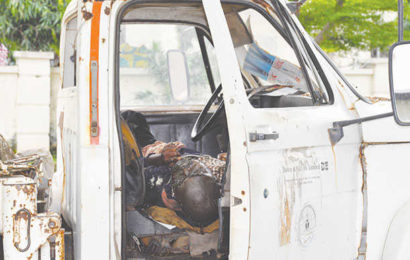
Most Nigerians are hearing about Monkeypox for the first time. The disease recently gone viral in the country and has made most citizens to be worried and asking questions in the need to be informed on how to stay safe from the virus.
As gathered from an online survey there is apparently no commercially available vaccine designed specifically for monkeypox. This however waken the need for 100% preventive practices as more and more Nigerians don’t want to be infected.
Below however is some fact checks on Monkeypox which could keep you informed
Monkeypox Symptoms, Signs, and Transmission
What are the clinical features of monkeypox?
In humans, monkeypox is similar to smallpox, although it is often milder. Unlike smallpox, monkeypox causes lymph nodes to swell (lymphadenopathy). The incubation period for monkeypox is about 12 days (range 7 to 17 days). The illness begins with fever, headache, muscle aches, backache, swollen lymph nodes, a general feeling of discomfort, and exhaustion. Within 1 to 3 days (sometimes longer) after the appearance of fever, the patient develops a papular rash (i.e., raised bumps), often first on the face but sometimes initially on other parts of the body. The lesions usually develop through several stages before crusting and falling off.
How long does monkeypox last?
The illness typically lasts for 2 to 4 weeks.
Is monkeypox fatal?
Studies of human monkeypox in rural central and west Africa ? where people live in remote areas and are medically underserved ? have reported case-fatality ratios of 1% to 10%.
How do people get monkeypox?
Monkeypox can spread to humans from an infected animal through an animal bite or direct contact with the animal?s lesions or body fluids. The disease also can be spread from person to person, although it is much less infectious than smallpox. The virus is thought to be transmitted by respiratory droplets during direct and prolonged face-to-face contact. In addition, it is possible monkeypox can be spread by direct contact with body fluids of an infected person or with virus-contaminated objects, such as bedding or clothing.
Can monkeypox be prevented?
Monkeypox can be prevented by avoiding eating or touching animals known to acquire the virus in the wild (mainly African rodents and monkeys). Person-to-person transfer has been documented. Patients who have the disease should physically isolate themselves until all of the pox lesions have healed (lost their crusts), and people who are caring for these patients should use barriers (gloves and face masks) to avoid any direct or droplet contact. Caregivers should obtain a smallpox vaccination (see below).
Because smallpox and monkeypox are so closely related, studies have suggested that people vaccinated against smallpox have about an 85% chance of being protected from monkeypox. Consequently, the CDC recommends the following:
- Patients with depressed immune systems and those who are allergic to latex or smallpox vaccine should not get the smallpox vaccine.
- Anyone else who has been exposed to monkeypox in the past 14 days should get the smallpox vaccine, including children under 1 year of age, pregnant women, and people with skin conditions.
Are there any commercially available vaccine designed specifically for monkeypox?
Answer: NO
Monkeypox facts
- Monkeypox is a viral disease that produces pox lesions on the skin and is closely related to smallpox but is not nearly as deadly as smallpox was.
- The history of monkeypox is new (1958), and the first human cases were diagnosed and differentiated from smallpox in the early 1970s.
- Monkeypox virus causes monkeypox. The majority of cases are transmitted from animals (rodents) to humans by direct contact. Person-to-person transfer, probably by droplets, can occur infrequently.
- Risk factors for monkeypox include close association with African animals (usually rodents) that have the disease or caring for a patient who has monkeypox.
- During the first few days, symptoms are nonspecific and include fever, nausea, and malaise. After about four to seven days, lesions (pustules, papules) develop on the face and trunk that ulcerate, crust over, and begin to clear up after about 14-21 days, and lymph nodes enlarge. There may be some scarring.
- The diagnosis of monkeypox is often made presumptively in Africa by the patient’s history and the exam that shows the pox lesions, however, a definitive diagnosis is made by PCR, ELISA, or Western blotting tests that are usually done by the CDC or some state labs. Definitive diagnosis is important to rule out other possible infectious agents like smallpox.
- Treatment may consist of immediate vaccination with smallpox vaccine because monkeypox is so closely related to smallpox. Treatment with an antiviral drug or human immune globulin has been done.
- In general, the prognosis for monkeypox is good to excellent as most patients recover. The prognosis may decrease in immunocompromised patients, and patients with other problems such as malnutrition or lung disease may have a poorer prognosis.
- Monkeypox is preventable as long as people avoid direct contact with infected animals and people. Vaccination against smallpox seems to afford about an 85% chance of avoiding the infection. There is no commercially available vaccine specifically for monkeypox.
- Research is ongoing to study antivirals, genetics, and rapid tests for monkeypox.








